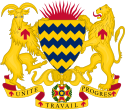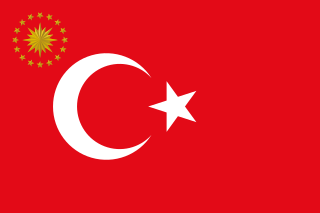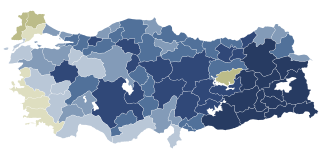 |
|---|
 |
|---|
A constitutional referendum was held in Chad and Ubangi-Shari on 5 May 1946 as part of the wider French constitutional referendum. The proposed new constitution was rejected by 66% of voters, with a turnout of 60%. [1]
 |
|---|
 |
|---|
A constitutional referendum was held in Chad and Ubangi-Shari on 5 May 1946 as part of the wider French constitutional referendum. The proposed new constitution was rejected by 66% of voters, with a turnout of 60%. [1]
| Choice | Votes | % | |
|---|---|---|---|
| For | 311 | 34.06 | |
| Against | 602 | 65.94 | |
| Total | 913 | 100.00 | |
| Valid votes | 913 | 96.82 | |
| Invalid/blank votes | 30 | 3.18 | |
| Total votes | 943 | 100.00 | |
| Registered voters/turnout | 1,575 | 59.87 | |
| Source: Sternberger et al. | |||

A referendum, plebiscite, or ballot measure is a direct vote by the electorate on a proposal, law, or political issue. A referendum may be either binding or advisory.

Direct democracy or pure democracy is a form of democracy in which the electorate directly decides on policy initiatives, without elected representatives as proxies, as opposed to the representative democracy model which occurs in the majority of established democracies. The theory and practice of direct democracy and participation as its common characteristic constituted the core of the work of many theorists, philosophers, politicians, and social critics, among whom the most important are Jean-Jacques Rousseau, John Stuart Mill, and G.D.H. Cole.

The president of Turkey, officially the president of the Republic of Türkiye, is the head of state and head of government of Turkey. The president directs the executive branch of the national government and is the commander-in-chief of the Turkish military. The president also heads the National Security Council.
A constitutional amendment is a modification of the constitution of a polity, organization or other type of entity. Amendments are often interwoven into the relevant sections of an existing constitution, directly altering the text. Conversely, they can be appended to the constitution as supplemental additions, thus changing the frame of government without altering the existing text of the document.
Constitutional conventions in Australia are significant meetings that have debated the Australian Constitution. The first two gatherings debated Federation and what form of Constitution to adopt, while the following conventions debated amendments to the document.
In the politics of the United States, the process of initiatives and referendums allow citizens of many U.S. states to place legislation on the ballot for a referendum or popular vote, either enacting new legislation, or voting down existing legislation. Citizens, or an organization, might start a popular initiative to gather a predetermined number of signatures to qualify the measure for the ballot. The measure is placed on the ballot for the referendum, or actual vote.

A referendum, in the Italian legal system is a request directed to the whole electorate to express their view on a determined question. It is the main instrument of direct democracy in Italy.
In Australia, referendums are public votes held on important issues where the electorate may approve or reject a certain proposal. In contemporary usage, polls conducted on non-constitutional issues are known as plebiscites, with the term referendum being reserved solely for votes on constitutional changes, which is legally required to make a change to the Constitution of Australia.

The Australian republic referendum held on 6 November 1999 was a two-question referendum to amend the Constitution of Australia. The first question asked whether Australia should become a republic, under a bi-partisan appointment model where the president would be appointed by the federal parliament with a two-thirds majority. This was the model that was endorsed by the Constitutional Convention, held in Canberra in February 1998. The second question, generally deemed to be far less important politically, asked whether Australia should alter the Constitution to insert a preamble.

A constitutional referendum was held in France on 21 October 1945. Voters were asked whether they approved of the Assembly elected on the same day serving as a Constituent Assembly, and whether until a new constitution was approved, the country would be governed according to a proposed set of laws that appeared on the ballot paper. If the first proposal had not been approved, the Third Republic would have been restored, but its approval led to the elected Assembly drafting a constitution and proposing it to the people a year later, resulting in the creation of the Fourth Republic. Both were approved by wide margins with a turnout of 79.8%.

A constitutional referendum was held in France on 5 May 1946. Voters were asked whether they approved of a new draft Constitution proposed by the Constituent Assembly elected in 1945.

A constitutional referendum was held in France on 13 October 1946. Voters were asked whether they approved of a new constitution proposed by the Constituent Assembly elected in June. Unlike the May referendum, which saw a previous constitutional proposal rejected, the new Constitution of 27 October 1946 was accepted by 53% of voters, and brought the Fourth Republic into existence. Voter turnout was 68%.

A constitutional referendum was held in France on 28 September 1958. Voters were asked whether they approved of the adoption of a constitution for the French Fifth Republic written by Charles de Gaulle. It was overwhelmingly approved, with 82.6% in favour. Voter turnout was 84.9% in metropolitan France and 79.8% overall.

A constitutional referendum on electoral reform was held in Turkey on 21 October 2007. After the aborted attempt to elect the next president in May 2007, the government of Recep Tayyip Erdoğan introduced substantial electoral reforms in parliament which were then passed with the votes of Erdoğan's Justice and Development Party and the opposition Motherland Party.

Proposition 7 of 1911 was an amendment of the Constitution of California that introduced, for the first time, the initiative and the optional referendum. Prior to 1911 the only form of direct democracy in California was the compulsory referendum.

A nationwide referendum was held in Moldova on 5 September 2010 on whether or not the country should amend the Constitution of Moldova to return to direct popular election of the president. Since 2001, the president had been indirectly elected by Parliament, with a supermajority of 61 seats required for election. The voters are asked to answer the following question: "Would you agree with the Constitutional amendment, which would allow the election of the President of the Republic of Moldova by the entire population?" Voters chose one of the proposed options: "Yes (for)" or "No (against)". Of those who had cast their vote, 87.83% chose "Yes". However, the referendum did not pass because only 30.29% of voters turned out, short of the necessary 33% for the referendum to be considered valid.

A constitutional referendum on a number of changes to the constitution was held in Turkey on 12 September 2010. The results showed the majority supported the constitutional amendments, with 58% in favour and 42% against. The changes were aimed at bringing the constitution into compliance with European Union standards. Supporters of Turkish EU membership hope constitutional reform will facilitate the membership process.

This national electoral calendar for 2012 lists the national/federal elections held in 2012 in all sovereign states and their dependent territories. By-elections are excluded, though national referendums are included.

The constitution of the French Fifth Republic allows three types of referendum: